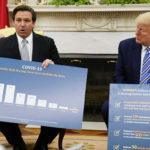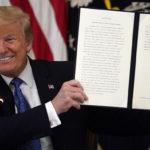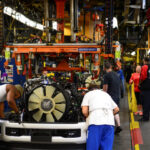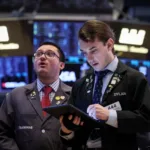By Tom Ozimek
An “America First” economic policy specialist praised President Donald Trump’s record on trade and the domestic economy, while calling for more action to nurture American industry and protect it from chief mercantilist rival China.
Alan Tonelson, who founded the public policy blog RealityChek, told The Epoch Times that Trump’s international economic policies have delivered on the promise of stemming the decline of American manufacturing.
“Certainly I think there has been a reshoring back to this country that would not have taken place without the so-called ‘Trump trade wars.’ And at least as importantly, they seem to have stemmed continued offshoring,” Tonelson said.
“There do seem to be more and more companies that are more reluctant to send production overseas for fear that they will be hurt by U.S. tariffs somewhere down the road,” he added. “Or they simply don’t want to come into President Trump’s crosshairs.”
While hailing the administration’s policies on trade overall, the policy expert called for bolder steps to nurture American industries.
“Although I’ve been very pleased, generally, with the Trump performance on trade, I do think there’s a lot more to do on what people would call the industrial policy front.”
Tonelson argued for an expanded federal role in developing technologies, particularly those of strategic importance to the United States. He said he would like to see the White House take bolder steps to break through the reluctance of Republican lawmakers “to move away from their hard ideological resistance to the idea that government can do anything right except possibly national defense.”
Despite the hits U.S. manufacturing had taken pre-Trump, it still generates nearly two-thirds of all of the funding for research and development that’s spent each year by the U.S. private sector.
“So if you want the U.S. to remain a high-tech economy, it’s very difficult to see how that happens or how that continues unless you maintain a strong domestic manufacturing base,” Tonelson said.
The “America Firster” added that he wished to see a mechanism that would condition Trump’s corporate tax cuts on capital investment in America, noting that companies have used much of the tax relief for stock buy-backs, which “doesn’t increase or strengthen the American economy’s productive base.”
Tonelson said Trump’s trade policy was driven by the notion that unless America seizes the historic opportunity to challenge China on unfair trade practices like technology theft, the fight to save American manufacturing could be lost.
“If you’re still in a position where you’re permitting your main trade rivals to subsidize your key industries out of existence, or steal your intellectual property willy nilly, or to extort that intellectual property once your companies start to expand overseas, you’re likely to go be going nowhere fast,” Tonelson said.
‘America First’ Versus ‘Made In China 2025’
Tonelson said the Chinese Communist Party’s hostile actions in the economic arena—including cyber-attacks and intellectual property theft—represent the “number one threat” to American prosperity and security.
“I’m certainly concerned that a China—at least under the kind of regime that’s been ruling it since 1949, that kind of China—grabbing the global technological lead could very greatly endanger American security and prosperity simply through all the various tools of cyber warfare that have been developed recently and that surely will continue to be developed,” he said. “The Chinese have shown no reluctance to wage war along those lines,” he added.
Policy experts argue that through its “Made In China 2025” policy, which aims for global dominance in 10 key technological verticals including robotics and artificial intelligence, the Chinese regime seeks to displace the United States as the world’s foremost superpower and harm its interests.
“The goals of the plan are not only to put China at the top of the technology research and manufacturing food chain, but, in doing so, destroy Western competitors,” said Epoch Times contributor James Gorrie.
“At its core, the Chinese economy is founded on graft, theft, and horrific violence,” Gorrie said. “From 1949 to 1979, China’s economy was based on the state stealing the meager fruits from the labor of the Chinese people—and killing tens of millions of them in the process. Once China invited Western companies to make goods there, China’s economy continued to steal from its own, but expanded its scope of theft to stealing capital, technology, IP, even whole manufacturing plants from Western companies.”
Tonelson pointed out that not only does China depend on stolen U.S. technology in its bid to take world center stage, it also depends on American consumers to buy the products of Chinese manufacturing. This poses an ethical problem in its own right as labor in communist China isn’t always voluntary and sometimes occurs with grave violation of human rights.
One example is the roughly one million Uyghurs widely reported to have been incarcerated in a complex of detention centers and forced labor facilities in Xinjiang. Another is the persecution of the Falun Gong spiritual movement, some of whose members have been tortured to death in labor camps making products for export to Western markets.
American leaders, too, acknowledge the threat posed by Chinese economic hostility.
Last year’s report (pdf) concluding an investigation by the U.S. Trade Representative into claims of unfair Chinese trade practices found that the regime had resorted to tactics like illegal subsidies that hurt American companies, forced technology transfers, cyber intrusions, and intellectual property theft.
More recently, at a congressional hearing called “China’s Non-Traditional Espionage Against the United States: The Threat and Potential Policy Responses,” Judiciary Committee Chairman Chuck Grassley (R-Iowa) expounded on the communist threat.
“When it comes to espionage, FBI Director [Christopher] Wray has said, ‘There’s no country that’s even close’ to the People’s Republic of China,” Grassley said at the Dec. 12 hearing. “General Keith Alexander called China’s estimated gains from economic espionage of up to $600 billion, ‘the greatest transfer of wealth in history.’”
“China is believed to be responsible for 50 to 80 percent of cross-border intellectual property theft worldwide, and over 90 percent of cyber-enabled economic espionage in the United States. Reports issued this year by the White House Office on Trade and Manufacturing, the U.S. Trade Representative, and ODNI [Office of the Director of National Intelligence] all report detailed findings on China’s role as a prime cyberattacker and thief of American intellectual property and technology.”
Tonelson said he hopes Trump will stay tough on China.
“While he only rolled back a minor percentage of existing U.S. tariffs, he did suspend his threat to impose tariffs on the remaining 160 billion dollars’ worth of Chinese imports into the United States that had been coming in duty-free so far, and I thought it was exactly the wrong time to ease up on the Chinese,” Tonelson said.
Tonelson argued that China is now more vulnerable and therefore likely to blink first in the trade war due to extremely high Chinese debt-to-GDP ratio and dependence on dollars from export markets to buy commodities like oil that undergird China’s economic growth.
“China can’t make up the shortfall by building more roads and bridges forever,” Tonelson said of China’s need for foreign currency, adding that political tension was another vulnerability facing the Chinese regime.
“Not only considering the growing economic problems that they’ve been experiencing, there’s also a lot of political pressure that’s been caused by the Hong Kong crisis,” Tonelson said.
Manufacturing Is Key
“If we’re talking about manufacturing, specifically, I would point out that it’s historically been the nation’s leader in productivity growth,” Tonelson said. “If you value productivity growth, as you should, then you should be very concerned that this sector has lost that lead. One reason is that so much of its own most productive element has been either dumped out of existence or sent overseas.”
Tonelson has written books on free trade, globalization, and industrial decline. In “Race to the Bottom: Why a Worldwide Worker Surplus and Uncontrolled Free Trade are Sinking American Living Standards,” he argued that around the time of China’s accession to the World Trade Organization (WTO) at the turn of the century, the United States entered a “no-win global competition” against low-wage countries. By leveraging weak workers’ rights and lax workplace safety standards, countries like India and Mexico—but especially China—won investment from the West, causing wages and labor standards around the world to fall.
He also argued that low-wage competition hit many of America’s highest wage industries like aerospace and software, adding that the detrimental impact on U.S. manufacturing was not the result of free-market forces of comparative advantage, where countries naturally specialize in the production of certain goods.
“I’d say that relatively little of that comparative advantage has been the result of the free play of market forces,” Tonelson said. “It’s been created and continually distorted by foreign governments. So if you really believe that free-market capitalism is the way to go and that free-market capitalism is the best bet for the entire world to maximize prosperity, efficiency, technological progress, and so on, then you should be very concerned that subsidization of key industries is so prevalent everywhere.”
“The trade policy critics, especially of the America First stripe, were very concerned during the pre-Trump years that the then-ongoing failure of U.S. presidents and U.S. congresses to push back adequately against trade predation—not only by China, but by Japan, Germany, and virtually every other national economy you could think of—genuinely threatened to turn American domestic manufacturing into what you might call a second-class global citizen,” Tonelson said.
He added that “America Firsters” were never convinced that the United States could maintain satisfactory levels of prosperity, national security, and sovereignty without a strong manufacturing base.
While Tonelson praised Trump’s trade policies, arguing that “we have seen some signs of some of those damaging trends reversing themselves,” he acknowledged that the progress “certainly hasn’t come as fast as I would like to see.” Tonelson blamed the slower-than-hoped-for reversal of the decline of U.S. manufacturing on Trump’s need to secure Republican backing in the face of threats to his presidency.
“In Trump’s defense, he was hamstrung during his first two years in office by his clear conclusion that he couldn’t buck Republican orthodoxy too many times because he needed Republican support to prevent impeachment,” Tonelson said. “You can say he still faces that threat, but his position in grassroots Republican ranks is so overwhelmingly strong now, that he doesn’t have to worry so much.”
What Is ‘America First’ Economic Nationalism?
Tonelson, who has lectured widely on U.S. trade and broader economic policies for 30 years, told The Epoch Times that at its core, the “America First” school of economic nationalism prioritizes ensuring America’s wealth and security before seeking to manage global affairs.
“The main idea is to enhance American security, prosperity, economic competitiveness, and also political independence by capitalizing on this country’s unique ability to thrive independent of global conditions,” he explained.
The economic nationalist school of thought was the dominant U.S. approach to foreign economic policy for the first roughly 60 percent of the country’s history, through the mid-1930s.
“It was replaced, starting with Pearl Harbor, by what is now called ‘globalism’ and what in pre-Trump days used to be called ‘internationalism,’” Tonelson said.
He added that what replaced economic nationalism was the idea that the United States could only achieve adequate levels of security, prosperity, and independence by fostering great improvements in the global economy and global security conditions.
Tonelson said “America Firsters” seek to turn on its head the notion that the United States should sacrifice economically and expose itself to threats like a nuclear attack in an effort to steer global conditions in a certain direction, and that America should instead focus on managing its domestic circumstances, over which it has far more control.
“We’re certainly strongly opposed to what’s been the clear internationalist practice for decades before Trump of regularly sacrificing big portions of the country’s economic base for the sake of maintaining smooth alliance relations, for the sake of maintaining that global economic order. In fact, we see that globalist/internationalist approach as a great way to expose the United States needlessly to various dangers and various vulnerabilities.”
The America First approach is that, in Tonelson’s telling, the United States is not likely to be capable enough of steering global affairs in a favorable enough direction to serve as an anchor of its national security, “but it is more than amply strong and wealthy and wise enough to figure out how to prosper whatever happens outside its borders.”
“The America First strategy depends, in the last analysis, on the country trying to control what it can plausibly control,” he said. “Which is to say, developments and events inside its own borders, rather than trying to control what clearly is at least much harder to control, and that is development and events outside its own borders.”
“I do think that Trump deserves tremendous credit for opening the American political system’s eyes to a fundamentally new way to achieve critical, economic, and also national security goals,” Tonelson added. “And my hope is simply that if he does get re-elected that the focus becomes sharper, that the implementation becomes more consistent.”






